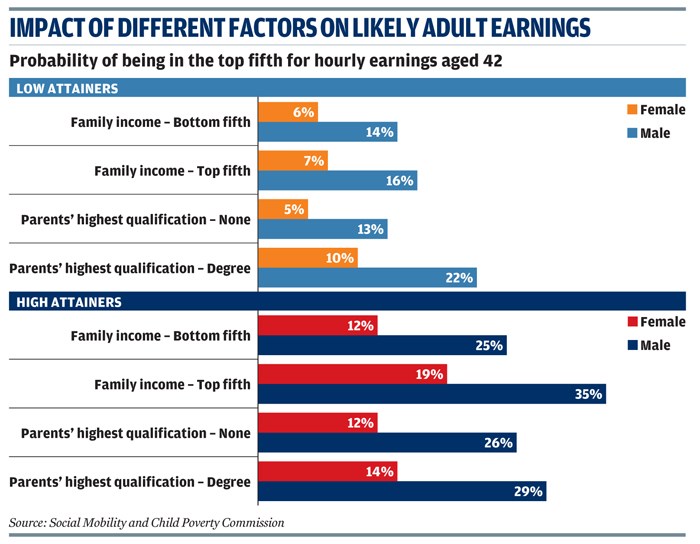Research Report: Downward Mobility, Opportunity Hoarding and the 'Glass Floor'
Charlotte Goddard
Monday, September 14, 2015
This piece of research aims to explore the impact of childhood poverty on future earnings, exploring the relationship between intelligence, social background and success.
Author: Abigail McKnight, London School of Economics
Published by: Social Mobility and Child Poverty Commission, June 2015

Summary
Author Abigail McKnight used data from 9,075 participants in the British Birth Cohort Survey, comparing outcomes in later life – earnings and job status – for children with relatively low cognitive skills at age five with results for children with relatively high cognitive skills, from both disadvantaged and better off families. McKnight then looked at factors that might account for the differences between the groups, including parental education; later childhood performance in reading and maths; and social and emotional skills in childhood, such as self-esteem, behaviour, type of secondary school attended, and whether or not individuals went on to get a degree qualification.
The author found about 40 per cent of children from the professional class were earning top wages at the age of 42, compared with only seven per cent of children from the unskilled class. Less bright children from high income backgrounds were 35 per cent more likely to be high earners at the age of 42 than children from poorer families who showed early signs of high ability. Girls from both social groups were less likely to be in high status jobs or earning top wages as adults. High-achieving boys from the poorest background had a 25 per cent chance of becoming a high earner as opposed to 12 per cent of girls. High-achieving boys from the most affluent background had a 35 per cent chance of becoming a high earner as opposed to 19 per cent of girls from the same class.
In addition to the impact that social class and affluence had on success in adulthood, low-attaining children were more likely to succeed in later life if their parents were degree-educated, they went to a grammar school or private school, and had later developed maths skills and emotional and social skills (see graphic). The research also found a clear correlation between the social background of a child's grandfather and eventual labour market success.
The research concludes better-off middle-class parents create a "glass floor" that protects their children from downward mobility and makes it harder for able children from less advantaged backgrounds to succeed. More advantaged parents also have the ability to exercise more choice in school by moving to desirable catchment areas or paying for private education to help their children overcome their lack of ability and so overtake their more intelligent but poorer peers.
Implications for practice
The report suggests employers should ensure internships are available to the less advantaged as well as those with the right social contacts, and that recruitment processes are not skewed to favour "polish over potential".
Schools should do more to help children from less advantaged families build on high early potential. The research recommends school selection processes in particular should be scrutinised to ensure they do not inadvertently skew access towards those from advantaged backgrounds who can afford extensive private tuition. Parents should be educated to improve their skills and perspectives through adult skills programmes, to tackle the direct link between parental education and child outcomes. Children from less advantaged backgrounds should be given access to opportunities available to their peers, such as opportunities for them to build non-cognitive and "soft" skills, good careers information and guidance, mentoring and plenty of opportunities to understand the world of work.
Further reading
The Glass Floor: Education, Downward Mobility and Opportunity Hoarding, Richard Reeves and Kimberley Howard, Centre on Children and Families at Brookings, 2013. This looks at the same issue from an American perspective.
Progress Made by High-attaining Children from Disadvantaged Backgrounds, Claire Crawford, Lindsey Macmillan, Anna Vignoles, Centre for Analysis of Youth Transitions, Social Mobility and Child Poverty Commission, June 2014. A report tracking the performance of high-achieving pupils from poor backgrounds through the education system and comparing their trajectories with those of their more advantaged peers.
A Long Division: Closing the Gap in England's Secondary Schools, Jonathan Clifton and Will Cook, Institute for Public Policy Research, September 2012. Research showing that even if every pupil in the country attended an outstanding school, the achievement gap between the poorest and wealthiest pupils would only be cut by a fifth.




